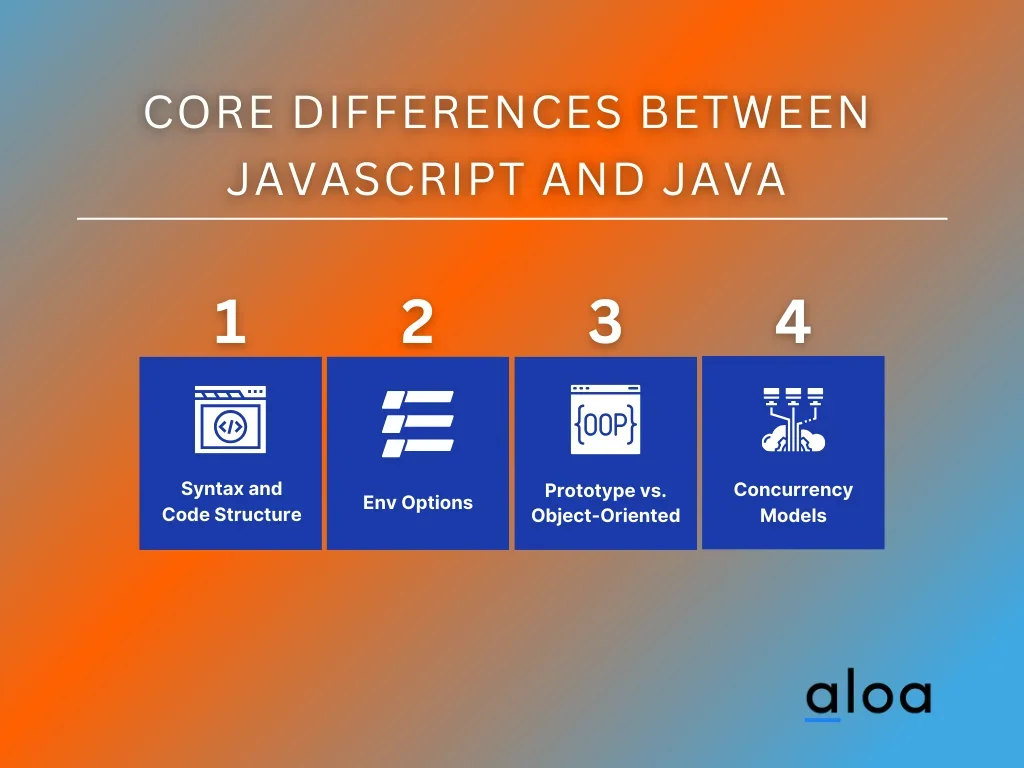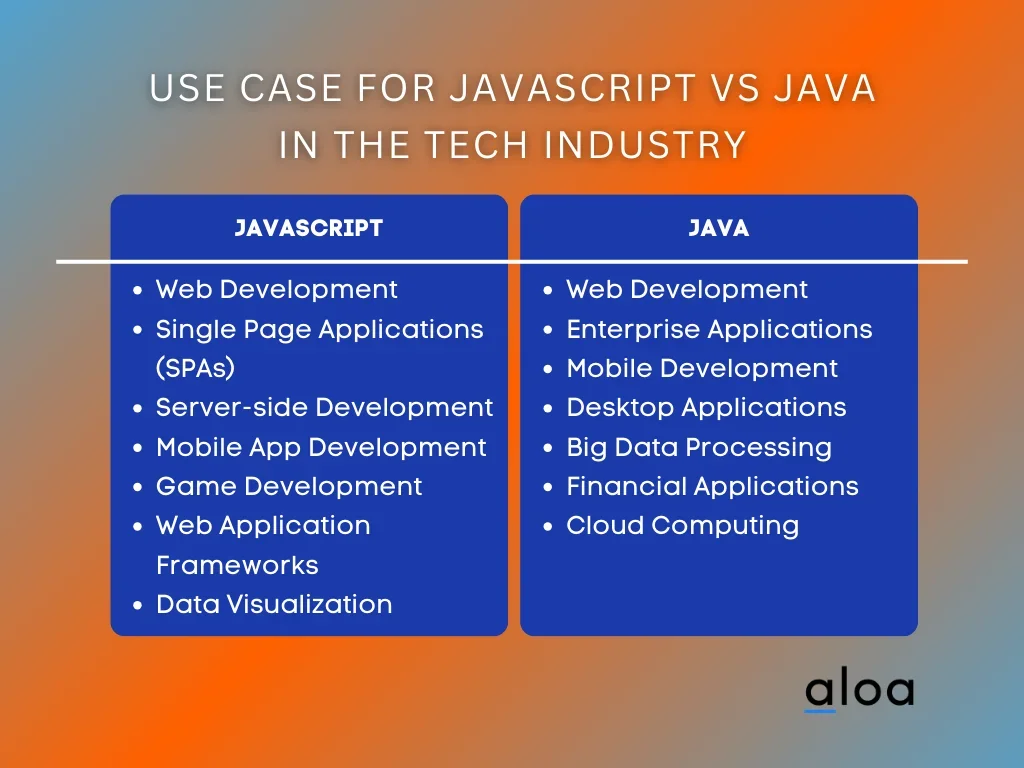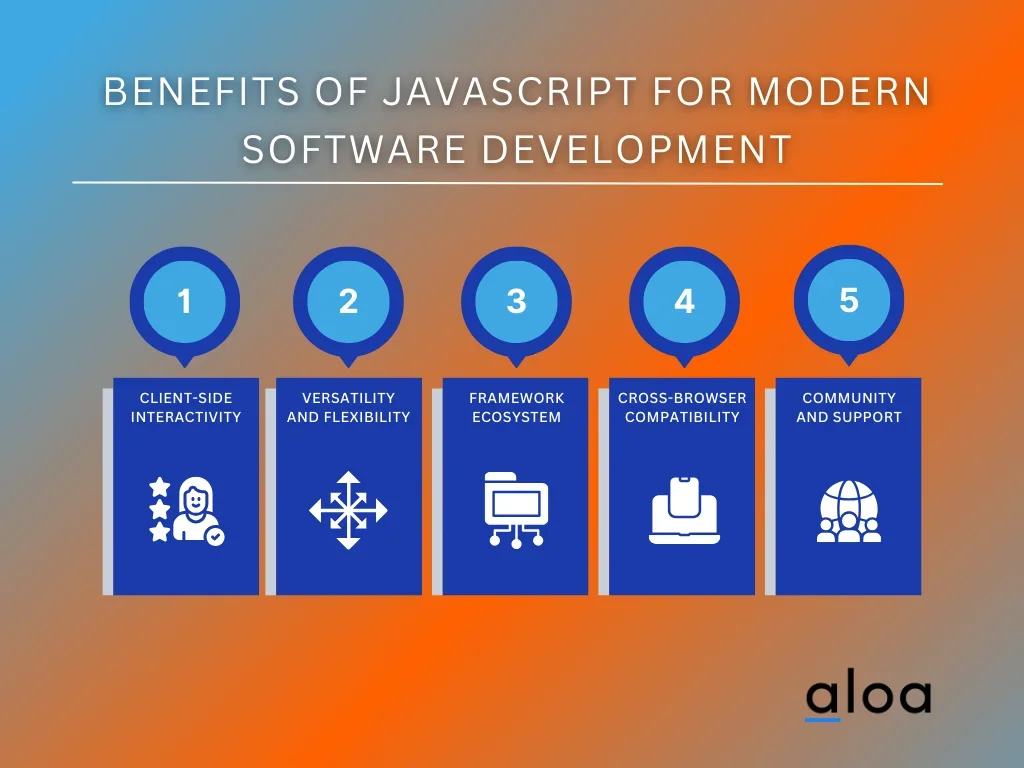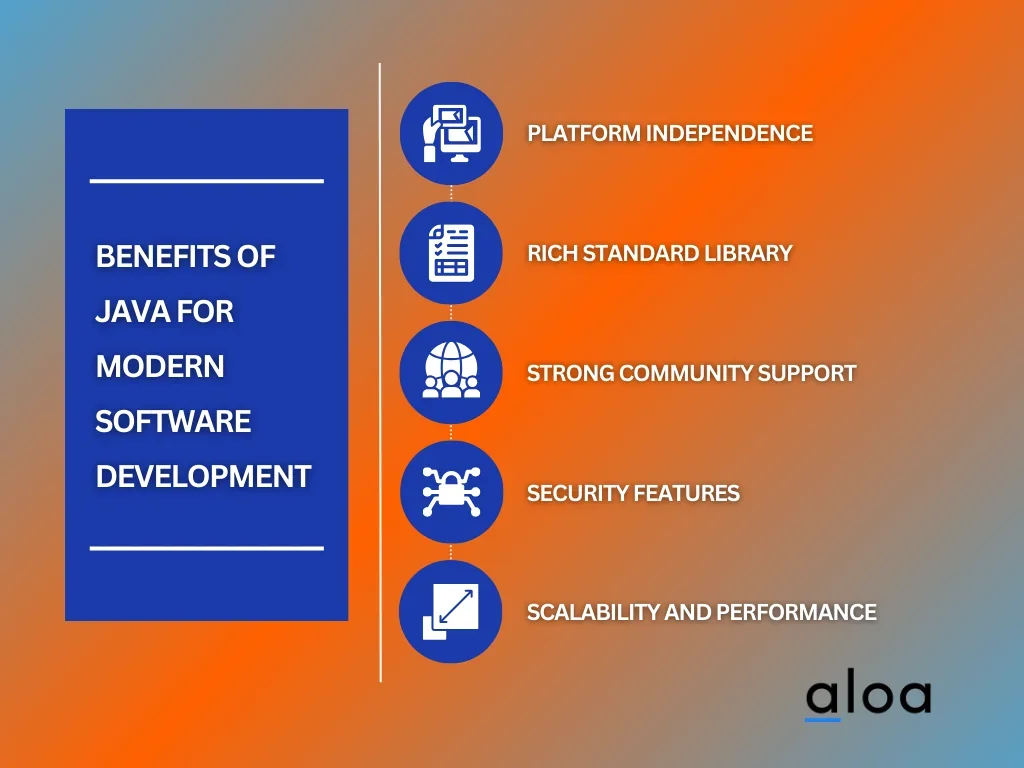Understanding the differences between JavaScript vs Java is crucial for individuals diving into the world of programming. Each language brings unique characteristics and features, influencing the outcome of your software development projects. Whether focusing on web development, server-side programming, or mobile app development, understanding these differences empowers you to align decisions with project requirements and objectives.
At Aloa, we’re dedicated to helping businesses and startups acknowledge the differences between JavaScript and Java. We understand the importance of identifying their distinctions to use them effectively for various development tasks. Aloa aims to empower you by providing insights into the disparities between the two languages so you can make informed decisions that match your project's needs and goals.
With our deep understanding of programming languages, we've put together this guide to highlight the practical uses, advantages, and differences of JavaScript and Java in software development. We'll compare their syntax, performance, ecosystems, and suitability for various tasks, providing you with insights to make informed decisions for your projects. Afterward, you’ll have a clear comparison of the two languages to help you decide which is the perfect match for your development needs and goals.
Let’s begin!
JavaScript vs Java: What’s the Difference?
Understanding the differences between Javascript vs Java is fundamental for aspiring programmers to choose the right tool for their projects. Despite being robust, both languages serve divergent purposes and possess distinctive characteristics. Explore these fundamental differences between them to make informed decisions as you navigate your programming journey:
What is Javascript?
JavaScript, a scripting language conceived by Brendan Eich at Netscape Communications in the mid-1990s, has revolutionized the web development landscape. Unlike its namesake, Java, JavaScript operates as an interpreted language, executing directly within web browsers. This unique characteristic empowers developers to imbue web pages with dynamic, interactive elements, enriching the user experience.
Primarily synonymous with web development, JavaScript is the backbone of modern web applications, enabling developers to create captivating interfaces and responsive designs. JavaScript empowers developers to modify webpage content dynamically, respond to user actions in real time, and seamlessly integrate multimedia elements, fostering immersive user experiences. Such language achieves this by manipulating the Document Object Model (DOM).
What is Java?
Java stands as a pinnacle in programming languages, a creation of Sun Microsystems that emerged in the mid-1990s. Renowned for its versatility and power, Java has solidified its position as a powerhouse in the software development landscape. Java's architecture involves compilation into bytecode that executes on a Java Virtual Machine (JVM). This approach imparts a distinct advantage of platform independence, allowing Java programs to run seamlessly across various devices and operating systems.
Moreover, Java's robustness stands out as one of its most compelling features. Its syntax and strict type-checking mechanisms create resilient codebases, reducing the likelihood of runtime errors and enhancing overall program stability. This robust nature makes Java particularly well-suited for developing large-scale enterprise applications where reliability is important.
Core Differences Between Javascript and Java
JavaScript and Java are popular programming languages but differ significantly in several key aspects, ranging from syntax to execution environments and concurrency models. Recognizing these disparities is vital for choosing the correct language for specific development tasks and utilizing their distinct features effectively. Check out these fundamental differences between the two different programming languages to understand their unique characteristics:

Syntax and Code Structure
JavaScript and Java, despite their similar names, have vastly different syntax and code structures. This fact reflects their distinct design philosophies and purposes.
- JavaScript Syntax: JavaScript offers a more flexible and lightweight syntax reminiscent of scripting languages. It has fewer structural constraints, optional semicolons, and a focus on functional programming paradigms.
- Java Syntax: In contrast, Java features a structured and verbose syntax organized around classes with explicit type declarations and semicolons to terminate statements. It emphasizes strong typing and adheres closely to object-oriented principles. JavaScript source code can be directly embedded within HTML documents or in separate files.
Generally, JavaScript is all about flexibility and functional programming. It is cool with skipping semicolons and likes to keep things light. Meanwhile, Java is more about structure, detail, and sticking strictly to object-oriented principles with clear types. These two languages cater to different tastes and programming needs.
Execution Environment Variations
When executing programs, JavaScript and Java take different approaches, each tailored to their strengths and requirements.
- JavaScript: JavaScript programs execute directly within web browsers or through Node.js for server-side applications. They leverage JavaScript engines within browsers or the Node.js runtime environment, offering versatility and scalability.
- Java: Java language programs typically run on a Java Virtual Machine (JVM), providing a platform-independent runtime environment. This approach allows Java applications to execute consistently across various platforms.
Basically, JavaScript thrives in the browser and Node.js environments, providing the flexibility and scalability it needs to excel. On the other hand, Java leans on the JVM for its platform independence.
Prototype-Based vs Object-Oriented
Prototype-based programming and object-oriented programming (OOP) stand as two prominent paradigms. JavaScript diverges with its prototype-based model, while Java embraces the classical class-based OOP. Developers should grasp these distinctions for effective navigation in today's programming landscape.
- JavaScript: JavaScript adopts a prototype-based programming model. Objects inherit directly from other objects, allowing for dynamic object creation and modification. It features loose typing that enables variables to hold values of any type without explicit declarations.
- Java: In contrast, Java follows a class-based inheritance model, emphasizing object-oriented principles such as encapsulation, inheritance, and polymorphism. It employs explicit class definitions and static typing to enforce data integrity.
Choosing between prototype-based and object-oriented programming depends on what the project needs. In dynamic web projects, JavaScript's prototype-based approach gives you the flexibility to adapt quickly. However, Java's class-based system is excellent for big, data-focused apps since it keeps things structured and types in check.
Concurrency Models
Understanding concurrency models is crucial in modern programming, where applications often need to perform multiple tasks simultaneously. JavaScript and Java offer distinct approaches to handling concurrency, each tailored to suit different environments and requirements.
- JavaScript Model: JavaScript in web browsers operates on an event-driven, single-threaded model known as the event loop. In this model, developers utilize asynchronous programming techniques like callbacks, promises, and async to handle concurrency without blocking the main thread.
- Java Model: Java provides robust support for multi-threading through its built-in threading libraries and concurrency utilities. Developers can create and manage threads efficiently, facilitating concurrent execution of tasks and optimal resource utilization.
Ultimately, JavaScript and Java have unique concurrency models suited to their environments. JavaScript's asynchronous model excels in web environments, ensuring responsiveness, while Java's multithreading suits heavy server tasks.
Tooling and Development Ecosystem
The tooling and development ecosystem surrounding programming languages is pivotal in shaping developers' productivity and efficiency. JavaScript and Java, two powerhouse languages, boast robust ecosystems tailored to their needs and requirements.
- JavaScript: JavaScript's ecosystem has seen exponential growth, especially with the rise of Node.js and leading frontend frameworks like React, Angular, and Vue.js. Software developers and software engineers use tools like npm (Node Package Manager) for package management, webpack for bundling, and modern IDEs like Visual Studio Code to streamline their workflows.
- Java: Java's ecosystem is a testament to maturity, fortified with potent development tools and IDEs like Eclipse and IntelliJ IDEA. Furthermore, it boasts sturdy build automation tools like Maven and Gradle, enhancing development efficiency.
That being said, JavaScript and Java offer thriving ecosystems with potent tools. JavaScript's dynamic ecosystem caters to web development with frameworks and specialized tools, while Java provides robust IDEs and build automation. Developers can tap into these resources to streamline their processes and innovate efficiently.
Use Case for Javascript vs Java in the Tech Industry
JavaScript and Java are powerful programming languages widely used in software development domains. Each shines in its unique way, catering to different needs and scenarios. Let's explore some common and distinct use cases for each:
Javascript’s Use Cases in the Tech Industry
JavaScript is a powerful language in web development, offering versatility and efficiency to software developers. With its ability to manipulate HTML and CSS in real-time within the browser, JavaScript empowers the creation of highly engaging and dynamic websites.

Here are some critical use cases for Javascript language to look for:
- Web Development: JavaScript empowers developers to create highly engaging and dynamic websites by seamlessly manipulating HTML and CSS within the browser in real-time. Frontend development is intuitive and efficient with frameworks like React, Angular, and Vue.js.
- Single Page Applications (SPAs): SPAs redefine user experience by eliminating cumbersome page reloads, ensuring a fluid navigation flow within a website. Frameworks like React, Angular, and Vue.js excel in creating SPAs, providing smooth transitions and instant content updates similar to native apps, all within the browser.
- Server-side Development: Node.js revolutionizes server-side development by allowing developers to harness JavaScript's capabilities beyond the client-side environment. With Node.js, developing server-side applications, APIs, and web servers becomes seamless, nurturing a unified JavaScript ecosystem ideal for full-stack development.
- Mobile App Development: JavaScript facilitates cross-platform development through frameworks like React Native or Ionic. These frameworks enable developers to leverage their JavaScript proficiency to build mobile applications seamlessly deployed across iOS and Android platforms.
- Game Development: JavaScript emerges as a formidable tool in game development, enabling the creation of captivating browser-based games and multi-platform gaming experiences.
- Web Application Frameworks: JavaScript frameworks like Express.js, Meteor.js, and NestJS empower developers to architect scalable and maintainable web applications with unparalleled ease.
- Data Visualization: JavaScript is a cornerstone in data visualization, enabling developers to translate complex datasets into intuitive and interactive visual representations.
Java’s Use Cases in the Tech Industry
Java's popularity makes it the cornerstone of modern software development, powering various applications across domains. Its scalability and platform independence contribute to its widespread adoption in enterprise and consumer software development.
Let's explore some common and distinct use cases for Java:
- Web Development: Java excels in creating dynamic websites and RESTful web services. With frameworks like Spring Boot, JSF, or Apache Struts, developers craft robust web solutions, ensuring seamless user experiences and efficient data management.
- Enterprise Applications: Developers use Java EE technologies or the Spring Framework to build large-scale applications tailored to organizational needs. These applications are known for their robustness, scalability, and adept handling of complex business logic.
- Mobile Development: Java is the primary programming language for Android application development. With its rich ecosystem of libraries and tools, developers can create feature-rich and high-performance Android applications catering to the diverse needs of mobile users.
- Desktop Applications: Java is a top choice for building cross-platform desktop applications. Whether using JavaFX or Swing, developers can craft desktop applications that run seamlessly on different operating systems, offering users intuitive interfaces and powerful functionalities.
- Big Data Processing: Developers craft scalable data processing applications, enabling businesses to extract insights and make informed decisions from large datasets using frameworks like Apache Hadoop or Spark.
- Financial Applications: Java is widely adopted in the finance industry for implementing trading systems, banking applications, and financial analytics tools. Renowned for its reliability, security, and performance, Java empowers developers to create mission-critical applications meeting financial sector standards.
- Cloud Computing: Java executes cloud-native applications with robust multi-threading, concurrency, and scalability support. Developers leverage Java to build resilient cloud apps deployable on AWS, Google Cloud, or Azure, unlocking cloud computing benefits for businesses of all sizes.
Benefits of Javascript for Modern Software Development
JavaScript, a versatile and powerful programming language, benefits modern software development. It isn't just about spicing up websites with interactive elements. It's also a fundamental component of the digital space, shaping user experiences and backend operations.
Uncover some of the critical benefits JavaScript brings in smooth functionality and enhanced performance across a wide range of applications:

Client-Side Interactivity
JavaScript empowers developers to create dynamic and interactive web pages by enabling client-side scripting. With JavaScript, developers can manipulate HTML elements, respond to user actions in real-time, and create engaging user interfaces, including animations, to enrich the browsing experience. This capability makes JavaScript indispensable for building modern web applications with rich, interactive features.
Versatility and Flexibility
JavaScript's versatility allows it to be used for various tasks beyond client-side scripting. With frameworks like Node.js, JavaScript can also be used for server-side development, enabling developers to build full-stack applications using a single programming language. JavaScript's versatility extends to backend development, minimizing language switching and promoting code reuse across the application stack.
Extensive Ecosystem of Libraries and Frameworks
JavaScript boasts a vast library and framework ecosystem that streamers development and accelerates time-to-market. It offers developers various tools, from frameworks like React.js, Angular, and Vue.js for UI building to libraries like jQuery for DOM manipulation. These resources enhance productivity and enable the efficient construction of robust applications.
Cross-Browser Compatibility
JavaScript's widespread adoption and standardized implementation across modern web browsers ensure excellent cross-browser compatibility. Developers can write JavaScript code confidently, knowing it will behave consistently across different browsers and platforms. This consistency simplifies the development process, reduces compatibility issues, and ensures a seamless user experience across various devices and browsers.
Community and Support
JavaScript benefits from a large and active community of developers, contributors, and enthusiasts who continually contribute to its growth and evolution. The vibrant JavaScript community offers abundant resources like documentation, tutorials, forums, and open-source projects. It makes learning, troubleshooting, and staying updated with the latest trends and best practices effortless for developers.
Benefits of Java for Modern Software Development
Due to its versatility and robustness, Java remains one of the most favored programming languages for modern software development. Its wide adoption across various industries makes it a valuable skill for developers seeking diverse opportunities in the job market.
Explore these Java's critical benefits to developers, businesses, and the overall software ecosystem:

Platform Independence
Java's "write once, run anywhere" principle allows developers to write code on one platform and execute it on any platform that supports Java without any modifications. This portability feature makes Java ideal for cross-platform development, saving time and effort in managing different versions for various operating systems.
Rich Standard Library
Java has a comprehensive standard library that provides ready-to-use components for various tasks, ranging from networking and data structures to graphical user interfaces (GUIs) and multithreading. This extensive library simplifies development, allowing developers to focus more on solving business problems.
Strong Community Support
Java boasts a vast and active community of developers, contributors, and users worldwide. This vibrant community ensures continuous improvement, timely updates, and many resources, including documentation, tutorials, forums, and third-party libraries. Developers can swiftly resolve issues, stay abreast of industry best practices, and collaborate effectively on projects using Java code by tapping into this support network.
Security Features
Security is a top priority in Java development, with features like bytecode verification, runtime checks, and a robust security manager to fend off vulnerabilities and malicious attacks. Additionally, Java's sandbox environment restricts the actions of potentially harmful code, enhancing the overall security of Java applications.
Scalability and Performance
Java's scalability and performance make it suitable for developing both small-scale applications and large-scale enterprise systems. With advanced features like multithreading, memory management, and just-in-time (JIT) compilation, Java applications can efficiently handle concurrent operations and deliver high performance even under heavy workloads.
Key Takeaway
Staying informed about JavaScript vs Java is pivotal for individuals exploring software programming. A comprehensive grasp of what each language offers in software development can significantly shape your approach to coding projects. You're opening doors to many possibilities for your software development endeavors by embracing these two prominent programming languages.
Recognizing the distinctions between JavaScript vs Java lays the foundation for crafting code that genuinely stands out. This understanding empowers developers to fine-tune their solutions, leveraging each language's unique features to maximize efficiency and effectiveness in tackling specific programming tasks.
Ready to elevate your programming journey? Explore the Aloa blog and discover how Javascript and Java complement each other seamlessly with our insightful reads: Java Development Company and Full Stack Java Developer Guide.
For any questions or guidance on navigating the distinctions between them, don't hesitate to contact us at resources@aloa.co. Let's dive on this journey together to unravel the complexities and unlock the potential of these languages!

